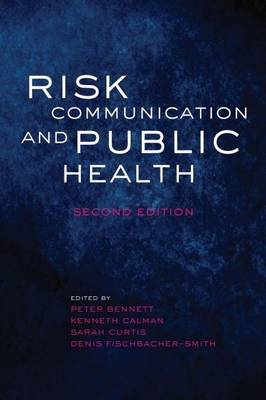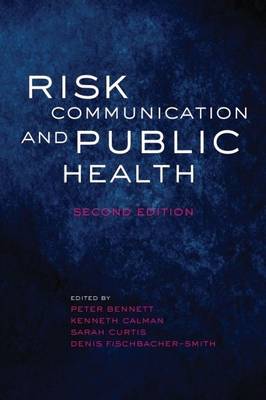
- Afhalen na 1 uur in een winkel met voorraad
- Gratis thuislevering in België vanaf € 30
- Ruim aanbod met 7 miljoen producten
- Afhalen na 1 uur in een winkel met voorraad
- Gratis thuislevering in België vanaf € 30
- Ruim aanbod met 7 miljoen producten
Zoeken
Risk Communication and Public Health
Peter Bennett, Kenneth Calman, Sarah Curtis, Denis Smith
Paperback | Engels
€ 122,95
+ 245 punten
Omschrijving
Controversies about risks to public health regularly hit the news, whether about food safety, environmental issues, medical interventions, or "lifestyle" risks, such as drinking. To those trying to manage or regulate risks, public reactions sometimes seem bizarre. To the public, the behavior of those supposedly "in charge" can seem no less odd. Trust is currently at a premium. This new edition of Risk Communication and Public Health covers the theoretical and research background, and presents a wide range of contemporary case studies and the learning experiences from these, and the political, institutional, and organizational issues they raise. It concludes with an analysis of the lessons learned and gives pointers for the future. The book offers international perspectives, and contributors include representatives from consumer organizations as well as public health practitioners and academics. This edition is substantially updated with new material and case studies, but retains the same focus--the improvement of communication and promotion of "good practice" in risk communication, in government, the health service, and elsewhere. This second edition presents a broad view of the issues around risk communication and public health in a way that will be of interest to a range of public health practitioners, managers and policy makers, postgraduate students and academics in a number of disciplines, and those interested in environmental health.
Specificaties
Betrokkenen
- Auteur(s):
- Uitgeverij:
Inhoud
- Aantal bladzijden:
- 320
- Taal:
- Engels
Eigenschappen
- Productcode (EAN):
- 9780199562848
- Verschijningsdatum:
- 22/02/2010
- Uitvoering:
- Paperback
- Formaat:
- Trade paperback (VS)
- Afmetingen:
- 231 mm x 157 mm
- Gewicht:
- 566 g

Alleen bij Standaard Boekhandel
+ 245 punten op je klantenkaart van Standaard Boekhandel
Beoordelingen
We publiceren alleen reviews die voldoen aan de voorwaarden voor reviews. Bekijk onze voorwaarden voor reviews.











